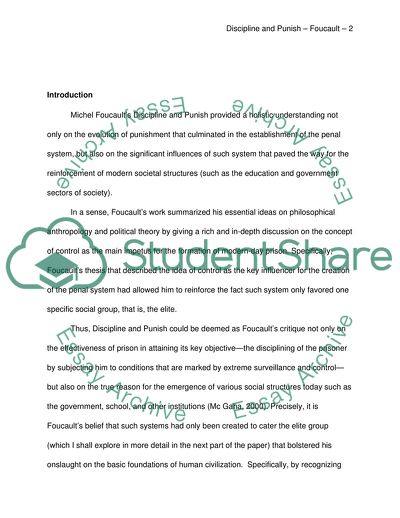Cite this document
(The Emergence of Prison in Modern Societies Essay Example | Topics and Well Written Essays - 2750 words, n.d.)
The Emergence of Prison in Modern Societies Essay Example | Topics and Well Written Essays - 2750 words. https://studentshare.org/history/1788654-discipline-punish-foucault-1975-is-not-just-a-history-of-the-emergence-of-the-prison-but-a-history-of-the-emergence-of-a-more-generalised-regime-of-disciplinary-regulation-in-modern-society-discuss-this-statement
The Emergence of Prison in Modern Societies Essay Example | Topics and Well Written Essays - 2750 words. https://studentshare.org/history/1788654-discipline-punish-foucault-1975-is-not-just-a-history-of-the-emergence-of-the-prison-but-a-history-of-the-emergence-of-a-more-generalised-regime-of-disciplinary-regulation-in-modern-society-discuss-this-statement
(The Emergence of Prison in Modern Societies Essay Example | Topics and Well Written Essays - 2750 Words)
The Emergence of Prison in Modern Societies Essay Example | Topics and Well Written Essays - 2750 Words. https://studentshare.org/history/1788654-discipline-punish-foucault-1975-is-not-just-a-history-of-the-emergence-of-the-prison-but-a-history-of-the-emergence-of-a-more-generalised-regime-of-disciplinary-regulation-in-modern-society-discuss-this-statement.
The Emergence of Prison in Modern Societies Essay Example | Topics and Well Written Essays - 2750 Words. https://studentshare.org/history/1788654-discipline-punish-foucault-1975-is-not-just-a-history-of-the-emergence-of-the-prison-but-a-history-of-the-emergence-of-a-more-generalised-regime-of-disciplinary-regulation-in-modern-society-discuss-this-statement.
“The Emergence of Prison in Modern Societies Essay Example | Topics and Well Written Essays - 2750 Words”. https://studentshare.org/history/1788654-discipline-punish-foucault-1975-is-not-just-a-history-of-the-emergence-of-the-prison-but-a-history-of-the-emergence-of-a-more-generalised-regime-of-disciplinary-regulation-in-modern-society-discuss-this-statement.


